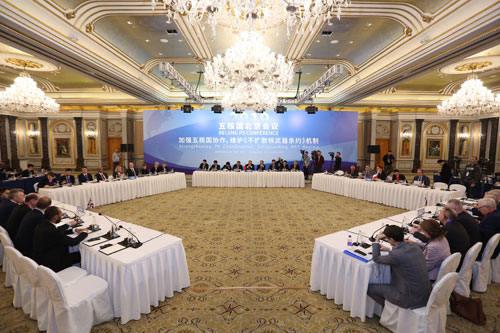
By Chen Yang
The topic of the so-called China-US-Russia Trilateral Arms Control Negotiations has frequently attracted attention in recent years. The year of 2020 marks the 50th anniversary of the entry into force of the Treaty on the Non-Proliferation of Nuclear Weapons (NPT). Recently, the US took this opportunity to repeat the old topic. US President Donald Trump said he will propose a bold and new trilateral arms control initiative with Russia and China, which will help avoid an expensive arms race.
In response, China's attitude is very clear: China's nuclear force is always kept at the minimum level required by national security, with an order-of-magnitude difference from that of the US and Russia. It is neither fair nor reasonable for China to participate in the arms control negotiations between the US and Russia.
However, China has no intention to join the so-called China-US-Russia Trilateral Arms Control Negotiations, which does not mean that China will not participate in international nuclear disarmament efforts.
The Chinese Ministry of Foreign Affairs Spokesperson Zhao Lijian recently said that "China will continue to work with all parties to strengthen communication and coordination within such frameworks as the mechanism of five nuclear-weapon states, and discuss a wide range of issues concerning global strategic stability." This means that China advocates strengthening communication and collaboration within multilateral frameworks and paying more attention to the role of multilateral mechanisms including the NPT.
The NPT is regarded as the cornerstone of international nuclear disarmament and nuclear non-proliferation mechanism, and is also an important part of the post-war international security system. With 190 contracting parties, the NPT covers most countries around the world. Nowadays, geopolitical games are intensifying, the military applicationof emerging technologies is accelerating, and as a result, global strategic stability is undermined. At the same time, some countries upholdthe unilateralist banner, leaving regional nuclear hotspots difficult to be resolved. There is also a prominent tendency to politicize the peaceful use of nuclear energy, disrupting normal international cooperation.
It is against this background that the value of the NPT should be more prominent. The international community needs to strengthen nuclear policy dialogue, maintain international consensus on nuclear disarmament and strengthen the NPT regime.
The multilateral cooperation mechanism formed within the framework of the NPT guarantees the universality, validity, and authority of the treaty. Take the P5 mechanism as an example,as the legal nuclear weapons states of the NPT, China, France, Russia, the UK, and the US have gradually formed a coordination mechanism in the process of reviewing the treaty and maintained regular communication on important issues and jointly advanced the review process since 2009.
For example, all parties conducted in-depth exchanges on nuclear policies and strategies, discussing issues such as nuclear disarmament, nuclear non-proliferation, and peaceful use of nuclear energy at the P5 Conference held in Beijing in 2019. Such cooperation under a multilateral framework is conducive to maintaining an international order based on international law, maintaining global strategic stability, maintaining international consensus on nuclear disarmament, and safeguarding the common interests of all countries. It is also such a multilateral cooperation mechanism that has effectively promoted the international nuclear arms control process and has continuously consolidated the international arms control and non-proliferation system.
Yang Yucai, a professor at the PLA National Defense University, believes that although the NPT has had its gains and losses since its entry into force, it will still be an important means for the international community to curb nuclear weapons proliferation. It is still necessary for the international community to maintain the authority of the treaty in the future and to advance nuclear disarmament under its framework.













